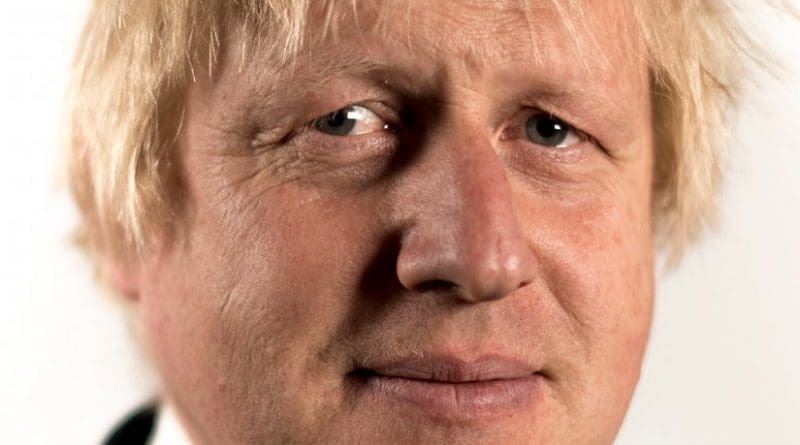Boris Fails To Lift Fog On UK’s Brexit Position – OpEd
By Arab News
By Cornelia Meyer*
UK Foreign Secretary Boris Johnson this week gave a much-anticipated Brexit speech. It was part of a charm offensive by the UK government aimed at trying to explain its position on its EU departure. Other ministerial addresses will follow over the course of the next two weeks.
The speech was pure Boris, long on rhetoric and charm, but short on facts and detail. He made it clear that the deed was done and there is no turning back from Brexit — a second referendum was out of the question. He went on to assure the audience that Britain would remain an open, international nation with strong ties to Europe. He brought in some detail by advocating the UK’s divergence from EU standards, particularly in manufacturing, medical science and financial services. He failed to explain, though, how that would impact on the free flow of goods across the Irish border. It all had a whiff of: “Don’t worry old boy, it will be alright on the night.”
The cavalier approach to Brexit negotiations, the lack of specificity of the UK position and the Cabinet infighting is precisely where the problem lies. These decisions are vital because they will impact on the United Kingdom for generations to come.
The last week was supposed to shed light on the shape of the UK’s post-Brexit relationship with the EU. On Feb. 5, the EU’s chief negotiator Michel Barnier met his UK counterpart David Davis for lunch at 10 Downing Street, the prime minister’s residence. Theresa May even popped in for a drink. It looked convivial, but it was not.
Not even Barnier’s charming French accent could gloss over the differences and apparent frustration. Barnier issued a polite but stark warning that, unless the UK could make up its mind as to what exactly it wanted the post-Brexit relationship to look like, it was increasingly unclear how successful it could be in the negotiations. If the other side (the UK) could not bring a clear vision to the table, the EU would inevitably be dictating the terms.
This should have served as a warning for the Cabinet’s Brexit committee, which held meetings to formulate the UK’s position later that week. It is now 20 months since the Brexit vote and 10 months since May invoked Article 50 to begin the divorce proceedings. The government is leaving it late to agree on the particulars of the UK’s demands in the negotiations. To make matters worse, the committee dealing with Brexit was so divided that there was no clear announcement of the trajectory on which the Cabinet intended to take the negotiations. Sources say that the only real agreement was that there was no agreement between the pro-EU side and the Brexiteers. The issues were the customs union, single market, and regulatory alignment with EU standards post-Brexit. The picture is as foggy as it was before.
Barnier poured oil on the fire toward the end of the week, when he declared that the EU had the right to sanction the UK if it was found to be in breach of the transition agreement. He may have a point, but his statement came at a particularly unhelpful time.
In her Florence speech last September, May had laid out a picture of a UK that was still trading freely with the EU after having left the union. Nice as it may sound, this was a bit of a “have your cake and eat it” approach. Now the Prime Minister is caught between the warring factions of her party and seems unwilling to decide. This is one of the reasons why the UK has done woefully little to say what the future relationship should look like. Time is running out and it is important for the warring factions in government to put country before party and their personal careers. Trade negotiations are detail-driven and can only reach a successful conclusion when the parties know exactly what they want. Squabbles back home while the talks are ongoing may ensure they end up as a train wreck for the UK.
Banks and insurance companies in the City of London need clarity as to what agreements the country will strike on services and the financial sector. Unless the government can quickly give some certainty on where the Brexit negotiations are headed and what the duration and dimensions of the transition agreement will be, they will relocate staff. In the meantime, Paris, Frankfurt and Dublin are on a charm offensive to gain as much business as possible. The same holds true for other sectors.
Given the current state of play, it looks increasingly unlikely that negotiators will be able to achieve an agreement on the transition period by the next EU Summit in March. The date when the UK will formally leave the EU — March 29, 2019 — is approaching fast. If the UK wants to limit the damage to its economy, it needs to send the message that Brexit will be smooth and business-friendly. This can only be achieved with a well-negotiated transition period affording everybody time to adjust to a life outside the EU, which is still the UK’s most important trading partner by a long shot.
We are waiting for the ministerial speeches to lift some of the fog. We may be in for a long wait, if Boris’s speech is anything to go by.
*Cornelia Meyer is a business consultant, macro-economist and energy expert. Twitter: @MeyerResources

